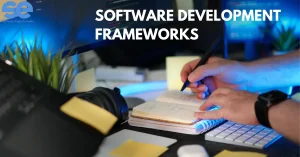A wrong software partner won’t just drain your budget. It drains your momentum and your confidence. It makes you question all the decisions that you made.
Everything looked perfect from the beginning. The team sounded sharp, their “yes, we can handle everything” felt reassuring.
After a few months, the cracks will show. There will be delays, and the quality of the software is disappointing.
If you want to avoid the mistakes we made, this article will be on your checklist. It’ll help you choose the right partner. It won’t be the surface-level checklist that everyone recycles.
Why Choosing The Right Software Development Partner Matters
Choosing the right software development company matters. The right partner challenges your thinking; the wrong one makes you think for them.
If you’re building your custom software from scratch or scaling your existing software, the right partner will make your investors feel confident and help you acquire more customers.
6 Red Flags to Avoid
Choosing the right vendor isn’t as straightforward as it seems. Even if their online reviews and portfolios impress you, don’t ignore the warning signs. Don’t choose a vendor just because it feels “right”.
Confidence doesn’t always mean competence. And timelines are useless if there isn’t deep research. Here are the red flags that you need to watch out for:
1. They Can’t Explain Their Reasoning
If a team cannot explain the reasoning behind each process, they’re hiding behind technical jargon. Also, if they’re unable to communicate clearly with you or your team, that’s dangerous. As a business owner, your vendor should tell you how this software saves you money or improves scalability.
2. Generic Testimonials
Their previous clients don’t mention what they liked about the company. The testimonials are generic and vague. The lack of genuine testimonials will signal a poor work ethic. Real clients will mention the challenges they faced and the outcomes they’ve received.
3. No Ongoing Support
Many teams will do a good job at the initial stage. But if they disappear after the project is complete, you’ll be expected to handle the bugs and user issues alone. A trusted software development partner will offer ongoing support.
4. Extremely Low Prices
While they may seem too good to be true, developing a software isn’t a cheap process. If they’re offering low prices, it’ll come with hidden pitfalls. The company will have junior developers or use outdated tools to build your custom software. This can lead to frequent breakdowns.
5. No Defined Project Owner
Confusion can occur in the absence of a project coordinator. A project coordinator should serve as the link between the internal team and the client.
6. They Agree to Everything You Say
Don’t get us wrong. If your partner agrees to everything you say, they aren’t challenging you enough. They have a fear of losing the deal and losing you as a client. A strong partner will have questions to ask you and suggest better methods to meet your goals.
6 Things to Look for in the Right Software Development Partner
After all the things that you need to avoid, the eligibility criteria have changed. Here are 6 things you need to look out for:
1. They Push Back with Clarity
Regardless of the skills, reviews, and a portfolio, pick a team that pushes your ideas. “Why do you want this feature?” or “What is the goal of the business outcome?”
Such inquiries indicate their care for your growth.
2. They Document Everything
Documentation can save you hours of rework and prevent accidental scope changes. Having a detailed document of your software will:
- Protect you from legal issues
- Lead to a higher customer satisfaction level
- Fewer support requests
Documentation ensures your software remains sustainable and aligned with your business goals.
3. They Take Ownership
They’ll take proactive measures to suggest alternative solutions. They’ll tell you which testing tools should be used, what needs rethinking, and what needs to be fixed. They’ll anticipate such situations and take full ownership of all the tasks.
4. They Show the Team
You’ll know exactly who is working on building your software. Companies offering software consulting services have a team of:
- Experienced developers
- Project managers
- Designers
You’ll know who to reach out to and receive full transparency.
5. Actual Case Studies
Their portfolio shows a diverse range of case studies. These case studies show:
- The challenges they solved
- Measurable outcomes
- Approach they followed
- The tools they used
The case studies won’t have any fancy buzzwords. It should tell you the real problems they solved and not just a technical task they completed.
6. They Prioritize Clarity
Work alongside a partner who communicates clearly. They won’t hide their processes from you. You’ll know exactly what’s happening in the project and the approach to risks. They’ll also break down the complexity into smaller steps.
Before You Begin: What Stage Are You In?
Before you make the final decision, ask yourself 1 question: What stage are you in?Depending on where your software stands and what your priorities are, you need to choose a software development partner who helps you move forward.
Stage 1: Minimum Viable Product (MVP)
If you’re building software from scratch, don’t fall into the feature fantasy trap. You have a vision that you want to follow. But you also have blind spots. Look for a partner who:
- Suggests a simpler workflow
- Cuts unnecessary features without hesitation
- Focuses on the why behind every requirement.
A bad partner will nod at everything you say, even if the tech stack is excessive. A good partner will question half your assumptions – Firmly and respectfully.
Stage 2: Moving Past MVP
During this stage, you don’t want to work with generalists. You want to work with an experienced team who will:
- Stress test your architecture
- Introduce better workflows
- Identify the areas where your software will break down.
Your approach to building your software will change at this stage. You’ll focus more on performance, maintainability, and long-term costs.
Stage 3: You’re Migrating or Modernizing
It looks easy on paper, but it isn’t glamorous. You’d need to work with developers who think outside the box. The right partner will:
- Spot hidden risks before your software goes live.
- Plan migrations in a realistic timeline.
- Analyze your existing software and understand older frameworks.
Very few companies know how to work with legacy software and predict issues without disrupting anything.
Why This Identification Stage Matters
Knowing which stage you’re in will directly impact your:
- Technical Needs
- Your Long-Term Project Success
- Business Goals
You’d want to work with a company that has stage-specific expertise. Different phases will demand distinct skills:
- MVP development needs simplicity and strategic prioritization
- Scaling requires architecture and workflow improvements
- Migration and modernization demand experience with legacy systems and risk planning.
Choose a partner that understands your stage and offers guidance in process planning and supports your evolving business objectives.
5 Questions You Should Ask
The answers to these 5 questions will help you avoid making the wrong choice. These questions dig deeper into how a company approaches software development.
Q1. What issues do you see in this project?
A weak partner might say “We don’t see any issues.”
A strong company will tell you:
- Limitations your software has
- Integration challenges
- Technical unknowns
A strong vendor won’t shy away from telling you the risks. If a team cannot tell you the improvement areas, they might be inexperienced.
Q2. How would you measure the success of this project?
You should be looking for metrics like:
- Milestones Achieved
- Clear KPI (Key Performance Indicators)
- Post Launch Stability
- Performance Metrics
Their definition of success should match yours.
Q3. How do you handle project delays and sudden scope changes?
It’s common for a project to hit turbulence. But the difference lies in the response. A strong partner would:
- Tell you about the delay
- Their escalation process
- How they prioritize their tasks
- The re-estimation cost when things change
This question will test their maturity. Experienced teams will follow the process. If the answer sounds too polished, the project will go off the rails.
Q4. Walk me through the last technical challenge your team solved.
A trusted company will tell you the story behind the technical challenge they faced. They’ll explain how they approached the problem and mention the outcome in simple terms. A weak partner would:
- Hide behind buzzwords
- Give vague answers
- Skip over the problems
- Leave you feeling confused
If they can’t describe how they solved tough problems, they won’t be able to solve yours.
Q5. Who will work on my project?
You’ll need names. You’ll need to know the title. You need to know the people behind your project. Asking this question will reveal:
- If they have a full-time team or freelancers
- If they’re going to outsource the project
- If you get stable continuity.
If your partner hesitates to answer this question or gives a vague answer, you know it’s time to move on.
Final Checklist
To sum up the checklist, here is your checklist:
- Shows real case studies
- Has a structured communication plan
- Assigns a clear point of contact
- Can explain their development workflow
- Pushes back when needed
- Offers post-launch support and transparency
- Speaks in simple language
Concluding Words
We’re dependent on software. They’re key to several of our activities, such as accounting, task management, and CRM. We have to partner with a vendor if we want to get a custom software build.
Choosing the right one can be a tedious process. But if you know the warning signs that you must avoid and the questions you should ask, you’ll be able to decide in no time.
Remember, choosing the right partner isn’t luck. It’s preparation. Use this blog as your cheat sheet and make the right decision.
Frequently Asked Questions
Q1. How do I know my vendor is technically capable?
Question them regarding the projects they have completed, the tools they use, and how they go about them. A technical interview could be done to test their knowledge.
Q2. How do I evaluate my partner’s technical depth if I’m not a technical founder?
This is challenging but it’s achievable. Look at their case studies and request clear explanations. Follow up on the best practices their developers follow for code quality.
Q3. How do I ensure a successful software development partnership?
You can do so by following this process:
- Define clear expectations
- Establish achievable milestones
- Have open lines of communication
- Actively monitor progress
- Provide prompt feedback
Q4. Can I expect post-launch support?
Of course! Most companies will be happy to offer you support after the project is complete. If you want to upgrade your software to the latest version or need to get bugs fixed, their team is 1 phone call away.









